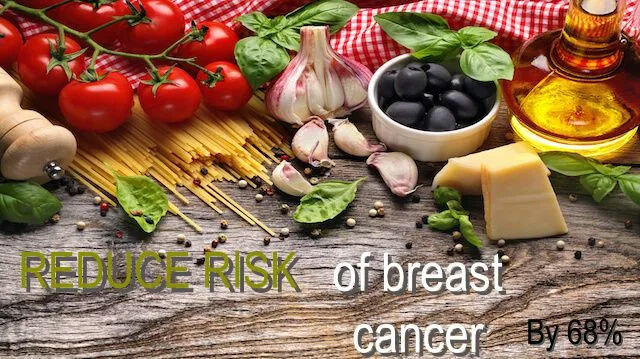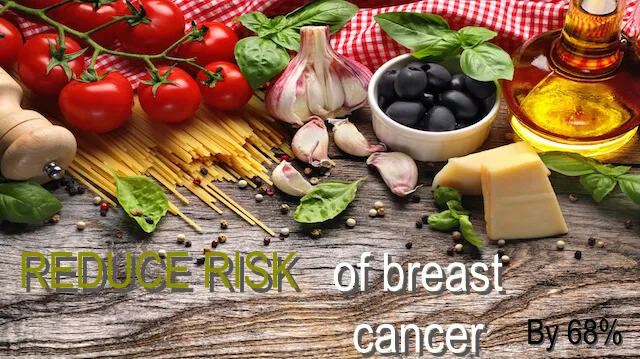
- Share on Facebook46
- Share on Pinterest
- Share on Twitter
Researchers have studied the Mediterranean diet extensively over the past decade. It has been associated with a decrease in heart disease, diabetes, inflammation and obesity. Findings on the diet’s health benefits have always been positive, and the diet is supported by health professionals, nutritionists and fitness enthusiasts.
Dr. Janet Bond Brill of the University of Miami wrote in her study on the Mediterranean diet and health, published in the American Journal of Lifestyle Medicine (2009), “The Mediterranean diet has long been celebrated as the gold standard of healthy diets for its highly palatable nature and favorable impact on the prevention of chronic diseases, promotion of greater longevity, and quality of life.”
In light of recent research released this month, the Mediterranean diet has now taken on a whole new role in health. Findings on the Mediterranean diet’s role in breast cancer prevention was published on September 15, 2015 in JAMA Internal Medicine, with over 20 authors contributing.
The study, a randomized trial, assigned 4,152 women one of three dietary plans: the Mediterranean diet concentrating on extra-virgin olive oil, a supplemented mixed-nuts diet, and a control group diet plan that only reduced fat. The study also took into account cancer risk associated with family history, daily activity, age, body mass index (BMI), alcohol and smoking.
The participants were followed for almost five years and the results of the study were astounding. In comparison with the control group, those on the Mediterranean diet decreased their risk for breast cancer by 68 percent. It has been estimated that one in eight women (12 percent) will develop develop breast cancer, so such a drastic decrease in the risk for the disease is groundbreaking.
“This is good news,” stated Dr. Miguel Martinez-Gonzalez in an interview with The New York Times. Dr. Martinez-Gonzalez is a professor of preventive medicine at the University of Navarra, Spain, and one of the principal authors of the new research. “We usually don’t have clinical trials of nutrition. This is the first with a dietary pattern showing we can reduce the risk of developing breast cancer.”
The Mediterranean diet provides a wealth of whole grains (choose gluten-free only), olive oil, vegetables and fruits. It boasts exceptional vitamins, minerals and antioxidant power essential for your health and wellness. This delightful, cancer-preventing diet also places dairy and red meat low on the shopping list.
 Are you ready to make a diet switch for your health? Over 40,000 women are expected to die from breast cancer this year, according to BreastCancer.org. Breast cancer mortality rates are higher than those from any other type of cancer in women. And men, this is not only a woman’s problem anymore: BreastCancer.org states that over 2,000 cases of breast cancer will be reported in men this year as well.
Are you ready to make a diet switch for your health? Over 40,000 women are expected to die from breast cancer this year, according to BreastCancer.org. Breast cancer mortality rates are higher than those from any other type of cancer in women. And men, this is not only a woman’s problem anymore: BreastCancer.org states that over 2,000 cases of breast cancer will be reported in men this year as well.
There are many ways to decrease your risk for the many diseases that we as humans are susceptible to. One of the most natural and best ways to prevent disease is through diet and exercise. A 2004 study published in Nutritional Journal, authored by Michael S. Donaldson, director of research at the Hallelujah Acres Foundation, Washington stated, “It has been estimated that 30–40 percent of all cancers can be prevented by lifestyle and dietary measures alone.”
There’s no time like the present to improve your diet. A 68 percent chance of reducing your risk for breast cancer, a disease that one in eight women develop, is worth the extra research and planning before your weekly trip to the grocery store.
What do you think about the Mediterranean diet as a preventive measure?
— Stephen Seifert
Stephen Seifert is a writer, professor, adventurer and a health & fitness guru. His flair for travel and outdoor adventure allows him to enjoy culture and traditions different than his own. A healthy diet, routine fitness and constant mental development is the cornerstone to Stephen’s life.
Sources:
http://archinte.jamanetwork.com/article.aspx?articleid=2434738&resultClick=
http://ajl.sagepub.com/content/3/1/44.abstract
http://www.breastcancer.org/symptoms/understand_bc/statistics
http://www.nutritionj.com/content/3/1/19
- Share on Facebook46
- Share on Pinterest
- Share on Twitter

